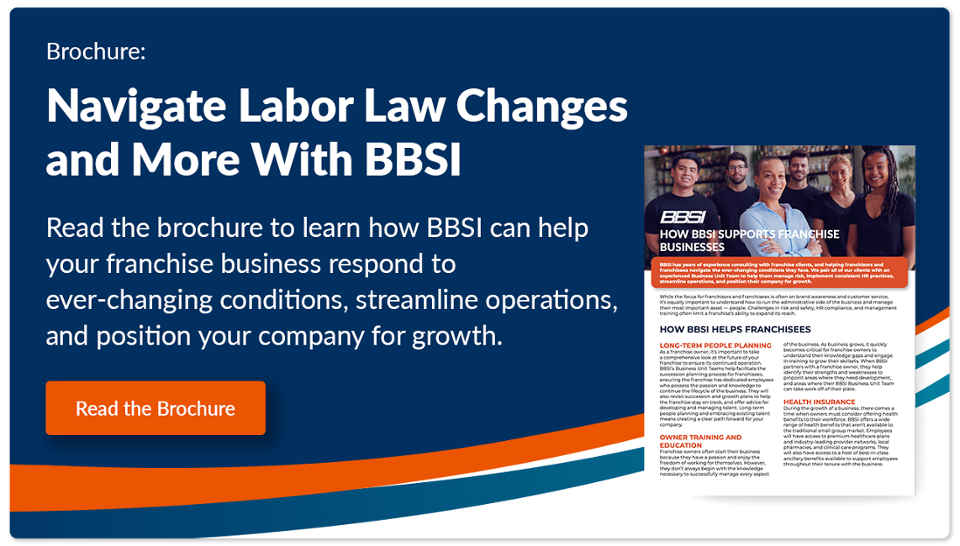
What Could AB257 Mean for Your Franchise Business?
As a franchise business owner, new employment, labor, and wage laws are especially impactful for the workplaces you operate. If you own multiple franchises, regulatory changes can impact hundreds, if not thousands, of employees across your locations.
California’s Assembly Bill 257 (AB257) is one change that will affect many franchise businesses, particularly those in the state’s fast food industry. Because the law creates a new regulatory council, it likely means compliance requirements will continue to evolve.
In this blog, we’ll break down everything you need to know about California’s AB257 and what you’ll need to do to meet regulatory requirements.
What is AB257?
AB257 — also known as the Fast Food Accountability and Standards (FAST) Recovery Act — was approved by California Governor Gavin Newsom on September 5, 2022. The law stipulates two major changes for California’s fast food industry.
- Establishes the Fast Food Council within the Department of Industrial Relations.
- Provides guidance for minimum wage changes in the fast food industry.
Establishing a Fast Food Council
AB257 establishes two different types of fast food councils:
- The statewide Fast Food Council, which reports to the California State Legislature.
- Local Fast Food Councils in individual counties or cities with populations of 200,000 people or more.
While the law doesn’t require individual counties or cities to establish Local Fast Food Councils, it does make it legal for jurisdictions to do so. Local councils report to the statewide council, and the latter will stipulate how local councils will be formed and their duties.
But which businesses will the AB257 Fast Food Council(s) oversee? The bill defines a fast food franchise as a company with 100 or more establishments nationwide that share at least one of the following:
- A “common brand”
- Standardized options for decor, marketing, and packaging
- Similar products or services
Per the bill, a “fast food restaurant:”
- Provides food for immediate consumption either on or off the premises
- Charges customers before serving their food
- Serves items prepared in bulk or kept hot for rapid service
- Does not offer “table service” but can offer kiosk ordering
If your fast food franchise meets the definitions above, it is subject to both AB257 and any regulations enacted by the statewide Fast Food Council.
Role of the Fast Food Council
The AB257 Fast Food Council will create and maintain fast food restaurant employment standards related to:
- Wages
- Working conditions
- Physical well-being and security of fast food restaurant workers
- Employee training
The council must also conduct a full review of fast food franchise health, safety, and employment standards at a minimum of every three years. These findings must be reported to the Department of Industrial Relations, the Governor, and the California Legislature.
Importantly, the council can also make revisions, amendments, or additions to fast food labor laws, but these regulation changes only become law if they’re supported by a petition with at least 10,000 signatures from fast food workers.
Any regulations issued by the council will supersede conflicting regulations issued by other state agencies.
Members of the Council
Per AB257, the statewide Fast Food Council will have ten members, each serving a four-year term:
- One Department of Industrial Relations representative
- Two representatives of fast food restaurant owners/franchisers
- Two representatives of fast food franchisees
- Two representatives of fast food workers
- Two advocates for fast food restaurant employees (like union reps or legal experts)
- One representative from the Governor’s Office of Business and Economic Development
All positions are appointed. The Governor will appoint the representatives for state agencies, fast food owners/franchisors, franchisees, and employees, as well as one council chairperson. The Speaker of the Assembly and the Senate Rules Committee will each appoint one advocate for fast food restaurant workers.

Council Meetings
According to AB257, the council is required to meet or hold hearings at least once every six months. These meetings will be open to the public — including fast food workers — and will provide an opportunity for public opinions to be heard regarding fast food restaurant issues.
Public meetings represent a significant win for fast food workers in California who face unionization barriers and labor law challenges. However, they also provide fast food franchise business owners an opportunity to be heard.
Minimum Wage Stipulations
While California’s Department of Industrial Regulations currently requires a $15.00 per hour minimum wage for businesses with 26 or more employees (and $14.00 per hour for companies with 25 or fewer), the statewide Fast Food Council has the power to create a new minimum wage that can override the current law.
But, there are two important limitations to note:
- Between January 1 and December 31, 2023, the minimum wage may not be greater than $22.00 per hour.
- Starting on January 1st, 2024, any increases must not exceed the current minimum wage by more than 3.5% or the annual rate of change of the US Consumer Price Index for Urban Wage Earners and Clerical Workers (whichever is lower).
Who Will AB257 Impact?
AB257 will primarily impact three groups:
- Franchisors: Despite being the main brand, many franchisors own and operate individual locations in California and will be subject to the council’s oversight. Further, California is already one of the most difficult states for opening franchises, which raises concerns AB257 may drive away or hurt statewide business. Note that an earlier draft of the bill made franchisors legally liable for franchisee actions, but that’s no longer the case.
- Franchisees: As the individual branch owners, franchisees will need to contend with an expected increase in the cost of business between anticipating higher minimum wages and any forthcoming rules. Moreover, non-franchise competitors will gain an advantage from lower operational costs as they fall outside the applicable restaurant criteria.
- Employees: If the law achieves its intended effect, then franchise employees will benefit from better working conditions and higher wages. However, there are some fears that jobs may be lost as franchisors and franchisees may adopt automation technologies or cut hours to keep compliance costs manageable.
Why Companies Should Start Preparing for AB257 Compliance Now
Franchises subject to AB257 who are found non-compliant can expect significant fines and penalties. Although some definitions and rules have yet to be finalized by the council, franchises need to begin preparing now because they will likely go into effect quickly once decided.
Moreover, the longer you wait to become compliant, the more difficult and costly it will be. This is because California can assess retroactive fines for compound violations, and the created Fast Food Council is expected to continually make new rules.
Preparation for AB257 compliance should begin with evaluating your current HR compliance obligations.
How Should Your Franchise Business Respond to AB257?
In the face of changing regulations posed by AB257, how should your fast food franchise business respond? Let’s break down four critical actions you can take now.
1. Partner with BBSI
Your initial HR compliance assessment will go much smoother and achieve better results with the right partner. Working with BBSI to prepare for AB257 compliance gives you access to:
- HR Consultants and compliance news: Our team of HR Consultants actively stays updated on California’s labor standards, practices, rules, and regulations, adjusting training and guidance with each new development.
- Business audits: We’ll assess your current compliance obligations and efforts and then develop a plan to help you achieve and maintain regulatory adherence.
- Deep dives into financial conditions and strategy: Our team will evaluate your business’s strengths and weaknesses to help you determine improvement and growth plans. If franchises know they’ll be affected by AB257 and their costs will increase, BBSI can help them calculate how much and how to best adapt.
Right now, the Fast Food Council’s composition and authoritative scope are known, but their forthcoming rules aren’t. So, it’s extremely beneficial to have a partner who can help you navigate the changes to come.
2. Inform Your Workers
While the law doesn’t require business owners to notify their employees of regulatory changes or council activities, keeping your workforce informed is a show of good faith.
Now that the bill has passed, consider:
- Publishing a notice alongside your required Labor Law Posters
- Sending out an email blast
- Adding an agenda item to your next staff meeting
Remember, your Labor Law Posters must include the minimum wage. So, if the council does update the minimum wage, make sure your posted literature reflects current information to remain compliant.
3. Attend Council Meetings
Now that AB257 has passed, the Fast Food Council will begin conducting public meetings every six months, providing an excellent opportunity for you and your staff to get more involved with the statewide fast food industry.
Attending the meetings isn’t required. But, by attending regularly, you could:
- Examine how your competition and its employees are responding to regulatory changes.
- Take note of hot-button issues for workers that could impact morale and workplace culture in your franchise locations.
- Show your employees that you’re invested in labor relations, workplace ethics, and fast food workers’ best interests.
It might also be beneficial to encourage employees to attend or listen in on the meetings. With more information about the industry in which they work, employees may discover a sense of empowerment to advance their careers or advocate for quality improvements in their workplaces — both of which are positive contributions to your business.
4. Get Involved With the Local Council
Depending on where you live, your franchise locations, and the statewide council’s chosen meeting place, it might not be feasible to be deeply involved in the legislative process.
The solution? Get involved with your local council.
While the statewide council will stipulate regional councils’ responsibilities and operations in time, keep your ear to the ground for potential developments that could impact your business.
You can help your local council (and reap the benefits described in the previous section) by:
- Helping to establish a new council in your county or city, providing expertise, resources, and support for a budding forum.
- Showing up to meetings as the local council takes shape, advocating for other franchise owners and their workers.
- Encouraging your staff to get involved in the process and learn more about the fast food industry as a whole.
Ultimately, you and your employees can be as involved as you’d like in local and statewide council proceedings, but the more you engage, the more likely your voice will be heard as the councils make changes that could impact your business.

How BBSI Can Help Your Franchise Business Respond to Labor Law Changes
AB257 may not significantly impact your business yet, but the creation of the Fast Food Council and the bill’s changes to minimum wage processes have the potential to affect your operations significantly.
As laws change, you deserve a partner in your corner who can help you make decisions about compliance, create positive change in your workplace, and stay competitive in an ever-changing industry. BBSI can provide all of the above — and so much more.
BBSI’s commitment to helping companies grow sets us apart from other providers. No matter which services you’re looking for, we’ll match you with a Business Unit Team with the capabilities to take your brand to the next level.
In your search for a worker’s comp, HR, or benefits administration partner, don’t settle for the bare minimum — choose BBSI and discover the value of partners who care.
Disclaimer: The contents of this white-paper/blog have been prepared for educational and information purposes only. Reference to any specific product, service, or company does not constitute or imply its endorsement, recommendation, or favoring by BBSI. This white-paper/blog may include links to external websites which are owned and operated by third parties with no affiliation to BBSI. BBSI does not endorse the content or operators of any linked websites, and does not guarantee the accuracy of information on external websites, nor is it responsible for reliance on such information. The content of this white-paper/blog does not provide legal advice or legal opinions on any specific matters. Transmission of this information is not intended to create, and receipt does not constitute, a lawyer-client relationship between BBSI, the author(s), or the publishers and you. You should not act or refrain from acting on any legal matter based on the content without seeking professional counsel.

